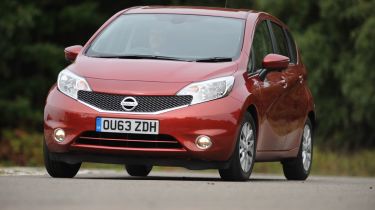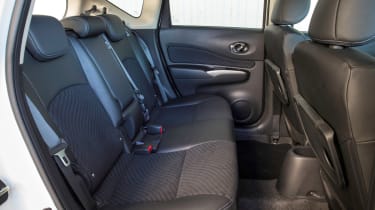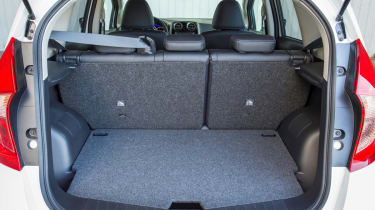Nissan Note (2013-2017) review - Practicality, comfort and boot space
The Nissan Note is an extremely practical and space-efficient car: its usability and Tardis-like room is one of its key selling points

Practicality is a real strong point of the Nissan Note. As we’ll see, its boot is extremely flexible, while rear-seat passenger space is very flexible if you choose mid-range models and above.
We found the seats a little flat and unsupportive for longer-distance journeys (something Driver Power results agree with – the Note is well below average here), but they’re OK for shorter-journey in-town use – and really wide door openings front and rear make it extremely easy to step in and out of. The rear doors open almost 90 degrees and the extra height off the ground further aids ease of stepping in and out.
The driving position is OK and clear controls make it easy to use. It’s a pity steering reach adjustment isn’t available on any Note variant though: saying that, the driving position is decent enough so its omission isn’t too painful.
It’s worth noting that air-conditioning is only standard on Acenta models and above, not the base Visia. Bluetooth connectivity does, however, feature on all Notes as standard. The Tekna models also get a handy ‘around view’ parking monitor that gives an uncanny ‘bird’s eye’ view around you on the central screen – a really cool yet handy gadget.
Size
The Note is a little larger than the supermini norm but, as we’ll see, it puts this to good use. Overall length is 4,100mm long, which stretches a little to 4,135mm if you take the Style pack (that’s because these models have an alternative aerodynamic front bumper design and a carbon-look rear bumper).
Used - available now

2022 Kia
Sorento
37,674 milesAutomaticPetrol1.6L
Cash £26,700
2022 Toyota
Corolla
23,108 milesAutomaticPetrol1.8L
Cash £16,500
2022 Mercedes
CLA
73,131 milesAutomaticPetrol1.3L
Cash £20,100
2020 Hyundai
Kona Electric
41,990 milesAutomaticElectric
Cash £12,200The Note is 1,695mm wide, making it a little narrower than many other cars offering this much interior space: city centre dwellers may find this advantageous. It’s a tall small car too, 1,530mm high or 1,535mm if you choose the glass roof option.
Leg room, head room & passenger space
Here is where the Note excels – it’s an extremely spacious supermini-sized car all round, for both front and rear seat passengers. Those in the front sit high, albeit on slightly flat and undernourished seats; the Note feels confident from behind the wheel as a result, with more big-car character than most superminis and supermini MPVs.
The real story is in the rear though. The rear bench seat of all Notes is comfortable and offers loads of headroom and legroom to passengers – but choose an Acenta Premium model or above and you get a full sliding rear bench that transforms the Note’s flexibility and space efficiency.
The boot size alters as you slide the seat back and forth, but the benefit is exceptional rear legroom if luggage space isn’t so important. The Note offers more rear legroom than some large executive cars almost a metre longer in overall length. The seat slides a full 160mm and the flexibility it offers is a real USP for Nissan’s supermini-sized MPV. Big, deep side windows add to the feeling of spaciousness for rear passengers.
The cabin is pretty practical, with a double-decker glovebox and numerous cupholders being the standouts: there are even dual cupholders in the rear seat armrest. It’s a pity the door pockets are so thin though – this is where the Note’s narrower dimensions over larger cars shows through.
Boot
The Note puts its square, tall dimensions to good use with a practical and user-friendly boot. Because it’s so practical, Nissan lists a number of dimensions for buyers to understand – and the key dimensions are for the ultra-practical sliding rear seat option, fitted to Acenta Premium models and above.
With the seats in their rearmost position, giving rear-seat passengers the maximum legroom, it offers 325 litres of space. Even this is 30 litres larger than a Ford Fiesta – but there’s more. Trade that rear passenger space and slide the seat fully forward, and luggage space extends to 411 litres – and that’s 30 litres larger than a Volkswagen Golf!
With the rear seats folded fully flat, a massive 1,495 litres of luggage space is available, way above what’s normal for a supermini-sized car (and significantly larger than the Nissan Juke crossover). With the seats down, a length of 1.7 metres is opened up. If you choose a ‘T-space-saver’ wheel instead of the puncture repair kit, luggage space drops by 30 litres; worth bearing in mind.
Nissan also has a super Flexiboard solution for the boot: this allows you to tailor the layout to numerous different compartments. You can even split it in two, creating dual load compartments that are ideal for securing fragile items (and it has a waterproof side too, enabling you to split muddy football kits). With the seats fully back and with the Flexiboard in its upper position, 195 litres of boot space is available – still and impressive amount given the all-round practicality.
We also like the fact Nissan’s even included several shopping hooks and a 12v socket in the boot – small additions that show the firm’s attention to detail here.









